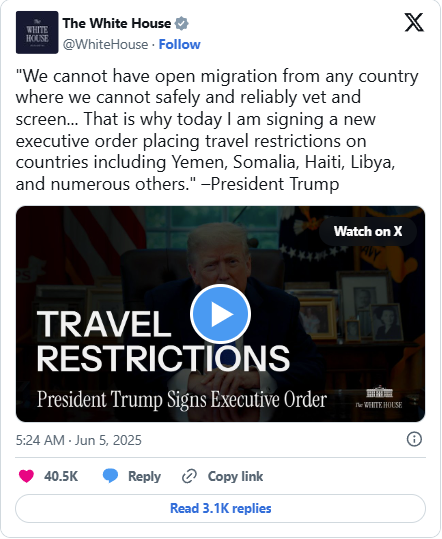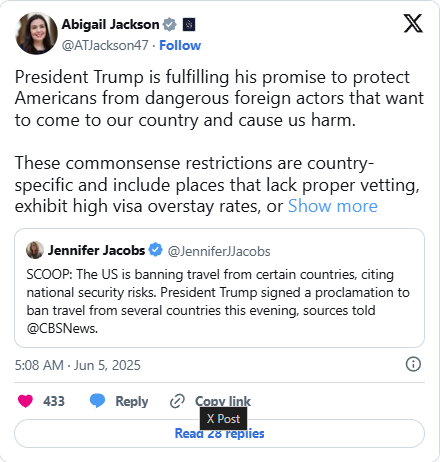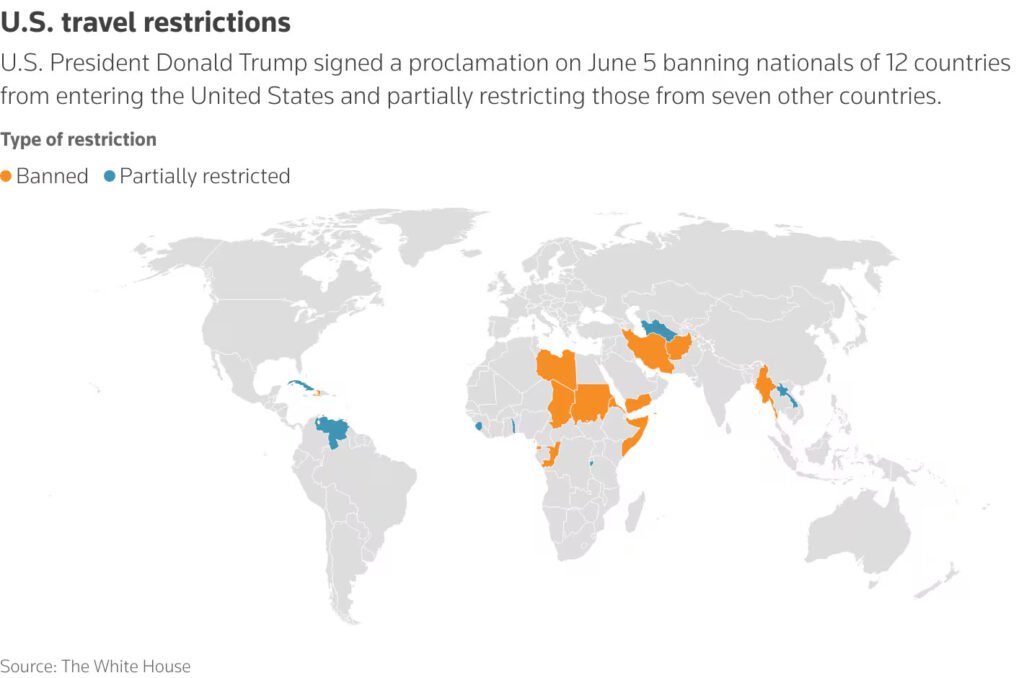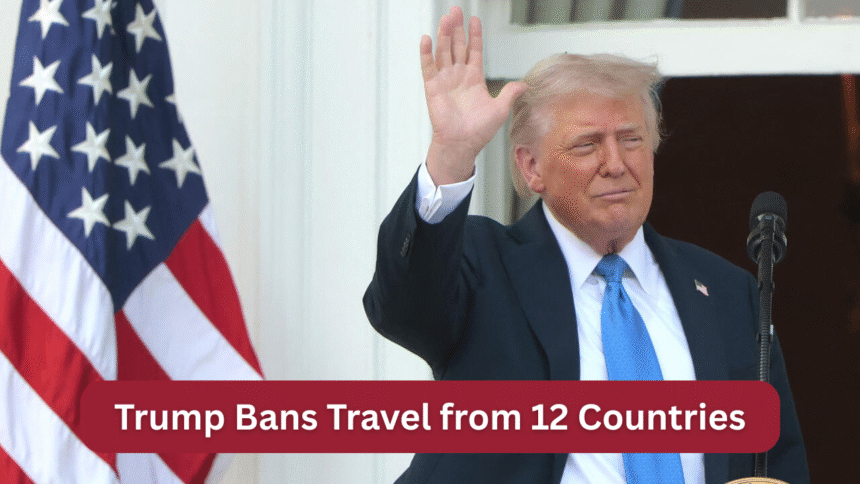President Donald Trump has introduced a sweeping new travel ban that targets 12 nations. The executive proclamation, signed on June 4, 2025, imposes full travel restrictions on citizens of these countries. Additional partial restrictions affect seven more, with enforcement scheduled to begin on June 9.
The administration justifies the action as a necessary response to growing national security threats. Officials cite failures in identity verification, visa overstays, and limited cooperation from certain foreign governments.
“The recent terror attack in Boulder, Colorado has underscored the extreme dangers posed to our country by the entry of foreign nationals who are not properly vetted,” Trump said in a video message from the Oval Office posted on X.

Countries on the List
The travel ban applies to the following countries: Afghanistan, Myanmar, Chad, Republic of the Congo, Equatorial Guinea, Eritrea, Haiti, Iran, Libya, Somalia, Sudan, and Yemen.
In addition, partial restrictions are set for citizens from Burundi, Cuba, Laos, Sierra Leone, Togo, Turkmenistan, and Venezuela.
This decision follows a violent attack in Colorado that reportedly involved an Egyptian national with an expired visa. The incident prompted strong calls from lawmakers and federal agencies for stricter controls on who enters and remains in the United States.
Echoes of 2017
The trump announcement closely mirrors the 2017 travel ban enacted during Trump’s first term. That earlier policy sparked protests and legal challenges. Although the current order is broader and involves more countries, critics still draw comparisons, especially given the religious and regional makeup of the affected nations.
Opponents argue that this new directive, like the previous one, unfairly targets Muslim-majority countries and nations grappling with political instability. While the administration insists that the Trump bans travel directive is purely security-focused, detractors question the selection criteria used to determine risk.
Legal and Political Repercussions
Legal action is already in motion. Civil liberties organizations have filed petitions claiming the ban is discriminatory and unconstitutional. They argue that no clear evidence supports the idea that citizens from these countries pose greater threats than others.
Despite that, many political allies of the former president stand firm behind the policy. They argue that Trump’s duty is to protect the American people and that waiting for further incidents would be reckless.
Abigail Jackson, a White House spokesperson, said on X (formerly Twitter), “President Trump is fulfilling his promise to protect Americans from dangerous foreign actors that want to come to our country and cause us harm.”

The current political climate has added intensity to the issue. With midterm elections looming, Trump’s opponents and supporters are using the ban to rally their respective bases. Whether courts uphold the order or strike it down could shape immigration policy debates for months to come.
Who Is Exempt?
The proclamation includes several exemptions. Lawful permanent residents, individuals with valid visas, and diplomats are not subject to the full restrictions. Additionally, some humanitarian exceptions will apply in limited cases.
International athletes and individuals contributing to essential events or projects may be granted waivers. However, the decision process will remain discretionary, handled by U.S. consular officials and the Department of Homeland Security.

Even with exemptions, the practical consequences are expected to be severe. Thousands of families, students, and professionals may find their plans indefinitely delayed or canceled.
Global and Diplomatic Reactions
International response has ranged from diplomatic concern to outright condemnation. Several foreign ministries have issued statements criticizing the ban and demanding formal dialogue. Many claim they were not notified before the policy was implemented.
Some leaders have warned that such unilateral actions could damage relations with Washington. They argue that international cooperation, not isolation, is the answer to global security threats.
The diplomatic fallout could extend into trade, aid agreements, and multilateral discussions. Foreign policy analysts warn that policies like this can alienate key allies in fragile regions.
Strategy or Symbolism?
Political analysts are divided on the purpose of the new restrictions. Some see the move as a calculated attempt to position Trump as tough on national defense in preparation for future elections. Others believe it reflects genuine concern over immigration loopholes and global instability.
What is clear is that the decision to reintroduce a travel ban was not made in isolation. Public opinion on immigration has shifted, with many Americans now supporting stronger border controls. The policy may resonate well among voters who prioritize national safety above diplomatic relations.
Supporters argue that Trump bans travel to safeguard American interests, not to provoke global backlash. They say weak screening systems abroad put the nation at risk, and decisive action is required.
Also, read about: Three Reasons The PS5 Star Wars: KotOR Remake Is Such A Huge Deal.
Broader Implications for Immigration
Beyond its immediate effects, the ban will likely reshape how immigration is handled for years to come. Visa systems for affected countries may face stricter vetting processes. Refugee applications could decrease due to increased rejection rates or prolonged processing times.
Colleges, businesses, and research institutions may also suffer. Many rely on talent and partnerships from around the world. The chilling effect of the ban may deter skilled professionals and students from considering the U.S. as a viable destination.
As federal agencies scramble to update protocols and issue new guidelines, confusion and delays are expected. Travel plans will be disrupted. Families will remain separated. Legal offices are preparing for a surge in casework related to waivers and challenges.
Reactions at Home
Public reaction across the U.S. has been deeply polarized. Supporters argue the policy is long overdue and addresses national vulnerabilities. They believe that vetting visitors more thoroughly is not xenophobic—it’s practical.
Opponents have already begun organizing protests in major cities. They argue that the ban is a step backward for America’s moral leadership and its promise as a land of opportunity. Many claim the directive punishes innocent people fleeing violence or seeking better lives.
Legal professionals, university administrators, and business leaders have expressed concern about the broader economic and cultural impacts. They fear the country could lose its competitive edge in global talent and innovation.
The fact that Trump bans travel for a second time in his political career shows how central immigration remains in his platform. Whether the courts, Congress, or public opinion will ultimately support or dismantle this policy remains uncertain.
To understand how similar dynamics unfold globally, readers can explore how the Dutch government collapses due to ideological rifts over immigration and social policy.

